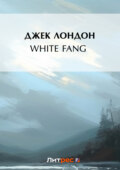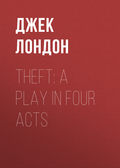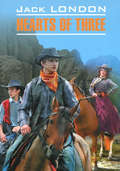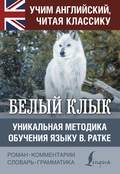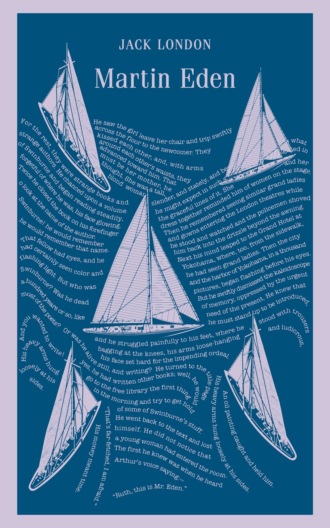
Джек Лондон
Martin Eden / Мартин Иден
Chapter II
The process of getting into the dining room was a nightmare to him. Between halts and stumbles, jerks and lurches, locomotion had at times seemed impossible. But at last he had made it, and was seated alongside of Her. The array of knives and forks frightened him. They bristled with unknown perils, and he gazed at them, fascinated, till their dazzle became a background across which moved a succession of forecastle pictures, wherein he and his mates sat eating salt beef with sheath-knives and fingers, or scooping thick pea-soup out of pannikins by means of battered iron spoons. The stench of bad beef was in his nostrils, while in his ears, to the accompaniment of creaking timbers and groaning bulkheads, echoed the loud mouth-noises of the eaters. He watched them eating, and decided that they ate like pigs. Well, he would be careful here. He would make no noise. He would keep his mind upon it all the time.
He glanced around the table. Opposite him was Arthur, and Arthur's brother, Norman. They were her brothers, he reminded himself, and his heart warmed toward them. How they loved each other, the members of this family! There flashed into his mind the picture of her mother, of the kiss of greeting, and of the pair of them walking toward him with arms entwined. Not in his world were such displays of affection between parents and children made. It was a revelation of the heights of existence that were attained in the world above. It was the finest thing yet that he had seen in this small glimpse of that world. He was moved deeply by appreciation of it, and his heart was melting with sympathetic tenderness. He had starved for love all his life. His nature craved love. It was an organic demand of his being. Yet he had gone without, and hardened himself in the process. He had not known that he needed love. Nor did he know it now. He merely saw it in operation, and thrilled to it, and thought it fine, and high, and splendid.
He was glad that Mr. Morse was not there. It was difficult enough getting acquainted with her, and her mother, and her brother, Norman. Arthur he already knew somewhat. The father would have been too much for him, he felt sure. It seemed to him that he had never worked so hard in his life. The severest toil was child's play compared with this. Tiny nodules of moisture stood out on his forehead, and his shirt was wet with sweat from the exertion of doing so many unaccustomed things at once. He had to eat as he had never eaten before, to handle strange tools, to glance surreptitiously about and learn how to accomplish each new thing, to receive the flood of impressions that was pouring in upon him and being mentally annotated and classified; to be conscious of a yearning for her that perturbed him in the form of a dull, aching restlessness; to feel the prod of desire to win to the walk in life whereon she trod, and to have his mind ever and again straying off in speculation and vague plans of how to reach to her. Also, when his secret glance went across to Norman opposite him, or to any one else, to ascertain just what knife or fork was to be used in any particular occasion, that person's features were seized upon by his mind, which automatically strove to appraise them and to divine what they were – all in relation to her. Then he had to talk, to hear what was said to him and what was said back and forth, and to answer, when it was necessary, with a tongue prone to looseness of speech that required a constant curb. And to add confusion to confusion, there was the servant, an unceasing menace, that appeared noiselessly at his shoulder, a dire Sphinx that propounded puzzles and conundrums demanding instantaneous solution. He was oppressed throughout the meal by the thought of finger-bowls. Irrelevantly, insistently, scores of times, he wondered when they would come on and what they looked like. He had heard of such things, and now, sooner or later, somewhere in the next few minutes, he would see them, sit at table with exalted beings who used them – ay, and he would use them himself. And most important of all, far down and yet always at the surface of his thought, was the problem of how he should comport himself toward these persons. What should his attitude be? He wrestled continually and anxiously with the problem. There were cowardly suggestions that he should make believe, assume a part; and there were still more cowardly suggestions that warned him he would fail in such course, that his nature was not fitted to live up to it, and that he would make a fool of himself.
It was during the first part of the dinner, struggling to decide upon his attitude, that he was very quiet. He did not know that his quietness was giving the lie to Arthur's words of the day before, when that brother of hers had announced that he was going to bring a wild man home to dinner and for them not to be alarmed, because they would find him an interesting wild man. Martin Eden could not have found it in him, just then, to believe that her brother could be guilty of such treachery – especially when he had been the means of getting this particular brother out of an unpleasant row. So he sat at table, perturbed by his own unfitness and at the same time charmed by all that went on about him. For the first time he realized that eating was something more than a utilitarian function. He was unaware of what he ate. It was merely food. He was feasting his love of beauty at this table where eating was an aesthetic function. It was an intellectual function, too. His mind was stirred. He heard words spoken that were meaningless to him, and other words that he had seen only in books and that no man or woman he had known was of large enough mental caliber to pronounce. When he heard such words dropping carelessly from the lips of the members of this marvellous family, her family, he thrilled with delight. The romance, and beauty, and high vigor of the books were coming true. He was in that rare and blissful state wherein a man sees his dreams stalk out from the crannies of fantasy and become fact.
Never had he been at such an altitude of living, and he kept himself in the background, listening, observing, and pleasuring, replying in reticent monosyllables, saying, “Yes, miss,” and “No, miss,” to her, and “Yes, ma'am,” and “No, ma'am,” to her mother. He curbed the impulse, arising out of his sea-training, to say “Yes, sir,” and “No, sir,” to her brothers. He felt that it would be inappropriate and a confession of inferiority on his part – which would never do if he was to win to her. Also, it was a dictate of his pride. “By God!” he cried to himself, once; “I'm just as good as them, and if they do know lots that I don't, I could learn 'm a few myself, all the same!” And the next moment, when she or her mother addressed him as “Mr. Eden,” his aggressive pride was forgotten, and he was glowing and warm with delight. He was a civilized man, that was what he was, shoulder to shoulder, at dinner, with people he had read about in books. He was in the books himself, adventuring through the printed pages of bound volumes.
But while he belied Arthur's description, and appeared a gentle lamb rather than a wild man, he was racking his brains for a course of action. He was no gentle lamb, and the part of second fiddle would never do for the high-pitched dominance of his nature. He talked only when he had to, and then his speech was like his walk to the table, filled with jerks and halts as he groped in his polyglot vocabulary for words, debating over words he knew were fit but which he feared he could not pronounce, rejecting other words he knew would not be understood or would be raw and harsh. But all the time he was oppressed by the consciousness that this carefulness of diction was making a booby of him, preventing him from expressing what he had in him. Also, his love of freedom chafed against the restriction in much the same way his neck chafed against the starched fetter of a collar. Besides, he was confident that he could not keep it up. He was by nature powerful of thought and sensibility, and the creative spirit was restive and urgent. He was swiftly mastered by the concept or sensation in him that struggled in birth-throes to receive expression and form, and then he forgot himself and where he was, and the old words – the tools of speech he knew – slipped out.
Once, he declined something from the servant who interrupted and pestered at his shoulder, and he said, shortly and emphatically, “Pew!”
On the instant those at the table were keyed up and expectant, the servant was smugly pleased, and he was wallowing in mortification. But he recovered himself quickly.
“It's the Kanaka for 'finish,'” he explained, “and it just come out naturally. It's spelt p-a-u.”
He caught her curious and speculative eyes fixed on his hands, and, being in explanatory mood, he said:-
“I just come down the Coast on one of the Pacific mail steamers. She was behind time, an' around the Puget Sound ports we worked like niggers, storing cargo-mixed freight, if you know what that means. That's how the skin got knocked off.”
“Oh, it wasn't that,” she hastened to explain, in turn. “Your hands seemed too small for your body.”
His cheeks were hot. He took it as an exposure of another of his deficiencies.
“Yes,” he said depreciatingly. “They ain't big enough to stand the strain. I can hit like a mule with my arms and shoulders. They are too strong, an' when I smash a man on the jaw the hands get smashed, too.”
He was not happy at what he had said. He was filled with disgust at himself. He had loosed the guard upon his tongue and talked about things that were not nice.
“It was brave of you to help Arthur the way you did – and you a stranger,” she said tactfully, aware of his discomfiture though not of the reason for it.
He, in turn, realized what she had done, and in the consequent warm surge of gratefulness that overwhelmed him forgot his loose-worded tongue.
“It wasn't nothin' at all,” he said. “Any guy 'ud do it for another. That bunch of hoodlums was lookin' for trouble, an' Arthur wasn't botherin' 'em none. They butted in on 'm, an' then I butted in on them an' poked a few. That's where some of the skin off my hands went, along with some of the teeth of the gang. I wouldn't 'a' missed it for anything. When I seen – ”
He paused, open-mouthed, on the verge of the pit of his own depravity and utter worthlessness to breathe the same air she did. And while Arthur took up the tale, for the twentieth time, of his adventure with the drunken hoodlums on the ferry-boat and of how Martin Eden had rushed in and rescued him, that individual, with frowning brows, meditated upon the fool he had made of himself, and wrestled more determinedly with the problem of how he should conduct himself toward these people. He certainly had not succeeded so far. He wasn't of their tribe, and he couldn't talk their lingo, was the way he put it to himself. He couldn't fake being their kind. The masquerade would fail, and besides, masquerade was foreign to his nature. There was no room in him for sham or artifice. Whatever happened, he must be real. He couldn't talk their talk just yet, though in time he would. Upon that he was resolved. But in the meantime, talk he must, and it must be his own talk, toned down, of course, so as to be comprehensible to them and so as not to shock them too much. And furthermore, he wouldn't claim, not even by tacit acceptance, to be familiar with anything that was unfamiliar. In pursuance of this decision, when the two brothers, talking university shop, had used “trig” several times, Martin Eden demanded: -
“What is trig?”
“Trignometry,” Norman said; “a higher form of math.”
“And what is math?” was the next question, which, somehow, brought the laugh on Norman.
“Mathematics, arithmetic,” was the answer.
Martin Eden nodded. He had caught a glimpse of the apparently illimitable vistas of knowledge. What he saw took on tangibility. His abnormal power of vision made abstractions take on concrete form. In the alchemy of his brain, trigonometry and mathematics and the whole field of knowledge which they betokened were transmuted into so much landscape. The vistas he saw were vistas of green foliage and forest glades, all softly luminous or shot through with flashing lights. In the distance, detail was veiled and blurred by a purple haze, but behind this purple haze, he knew, was the glamour of the unknown, the lure of romance. It was like wine to him. Here was adventure, something to do with head and hand, a world to conquer – and straightway from the back of his consciousness rushed the thought, conquering, to win to her, that lily-pale spirit sitting beside him.
The glimmering vision was rent asunder and dissipated by Arthur, who, all evening, had been trying to draw his wild man out. Martin Eden remembered his decision. For the first time he became himself, consciously and deliberately at first, but soon lost in the joy of creating, in making life as he knew it appear before his listeners' eyes. He had been a member of the crew of the smuggling, schooner Halcyon when she was captured by a revenue cutter. He saw with wide eyes, and he could tell what he saw. He brought the pulsing sea before them, and the men and the ships upon the sea. He communicated his power of vision, till they saw with his eyes what he had seen. He selected from the vast mass of detail with an artist's touch, drawing pictures of life that glowed and burned with light and color, injecting movement so that his listeners surged along with him on the flood of rough eloquence, enthusiasm, and power. At times he shocked them with the vividness of the narrative and his terms of speech, but beauty always followed fast upon the heels of violence, and tragedy was relieved by humor, by interpretations of the strange twists and quirks of sailors' minds.
And while he talked, the girl looked at him with startled eyes. His fire warmed her. She wondered if she had been cold all her days. She wanted to lean toward this burning, blazing man that was like a volcano spouting forth strength, robustness, and health. She felt that she must lean toward him, and resisted by an effort. Then, too, there was the counter impulse to shrink away from him. She was repelled by those lacerated hands, grimed by toil so that the very dirt of life was ingrained in the flesh itself, by that red chafe of the collar and those bulging muscles. His roughness frightened her; each roughness of speech was an insult to her ear, each rough phase of his life an insult to her soul. And ever and again would come the draw of him, till she thought he must be evil to have such power over her. All that was most firmly established in her mind was rocking. His romance and adventure were battering at the conventions. Before his facile perils and ready laugh, life was no longer an affair of serious effort and restraint, but a toy, to be played with and turned topsy-turvy, carelessly to be lived and pleasured in, and carelessly to be flung aside. “Therefore, play!” was the cry that rang through her. “Lean toward him, if so you will, and place your two hands upon his neck!” She wanted to cry out at the recklessness of the thought, and in vain she appraised her own cleanness and culture and balanced all that she was against what he was not. She glanced about her and saw the others gazing at him with rapt attention; and she would have despaired had not she seen horror in her mother's eyes – fascinated horror, it was true, but none the less horror. This man from outer darkness was evil. Her mother saw it, and her mother was right. She would trust her mother's judgment in this as she had always trusted it in all things. The fire of him was no longer warm, and the fear of him was no longer poignant.
Later, at the piano, she played for him, and at him, aggressively, with the vague intent of emphasizing the impassableness of the gulf that separated them. Her music was a club that she swung brutally upon his head; and though it stunned him and crushed him down, it incited him. He gazed upon her in awe. In his mind, as in her own, the gulf widened; but faster than it widened, towered his ambition to win across it. But he was too complicated a plexus of sensibilities to sit staring at a gulf a whole evening, especially when there was music. He was remarkably susceptible to music. It was like strong drink, firing him to audacities of feeling, – a drug that laid hold of his imagination and went cloud-soaring through the sky. It banished sordid fact, flooded his mind with beauty, loosed romance and to its heels added wings. He did not understand the music she played. It was different from the dance-hall piano-banging and blatant brass bands he had heard. But he had caught hints of such music from the books, and he accepted her playing largely on faith, patiently waiting, at first, for the lifting measures of pronounced and simple rhythm, puzzled because those measures were not long continued. Just as he caught the swing of them and started, his imagination attuned in flight, always they vanished away in a chaotic scramble of sounds that was meaningless to him, and that dropped his imagination, an inert weight, back to earth.
Once, it entered his mind that there was a deliberate rebuff in all this. He caught her spirit of antagonism and strove to divine the message that her hands pronounced upon the keys. Then he dismissed the thought as unworthy and impossible, and yielded himself more freely to the music. The old delightful condition began to be induced. His feet were no longer clay, and his flesh became spirit; before his eyes and behind his eyes shone a great glory; and then the scene before him vanished and he was away, rocking over the world that was to him a very dear world. The known and the unknown were commingled in the dream-pageant that thronged his vision. He entered strange ports of sun-washed lands, and trod market-places among barbaric peoples that no man had ever seen. The scent of the spice islands was in his nostrils as he had known it on warm, breathless nights at sea, or he beat up against the southeast trades through long tropic days, sinking palm-tufted coral islets in the turquoise sea behind and lifting palm-tufted coral islets in the turquoise sea ahead. Swift as thought the pictures came and went. One instant he was astride a broncho and flying through the fairy-colored Painted Desert country; the next instant he was gazing down through shimmering heat into the whited sepulchre of Death Valley, or pulling an oar on a freezing ocean where great ice islands towered and glistened in the sun. He lay on a coral beach where the cocoanuts grew down to the mellow-sounding surf. The hulk of an ancient wreck burned with blue fires, in the light of which danced the hula dancers to the barbaric love-calls of the singers, who chanted to tinkling ukuleles and rumbling tom-toms. It was a sensuous, tropic night. In the background a volcano crater was silhouetted against the stars. Overhead drifted a pale crescent moon, and the Southern Cross burned low in the sky.
He was a harp; all life that he had known and that was his consciousness was the strings; and the flood of music was a wind that poured against those strings and set them vibrating with memories and dreams. He did not merely feel. Sensation invested itself in form and color and radiance, and what his imagination dared, it objectified in some sublimated and magic way. Past, present, and future mingled; and he went on oscillating across the broad, warm world, through high adventure and noble deeds to Her – ay, and with her, winning her, his arm about her, and carrying her on in flight through the empery of his mind.
And she, glancing at him across her shoulder, saw something of all this in his face. It was a transfigured face, with great shining eyes that gazed beyond the veil of sound and saw behind it the leap and pulse of life and the gigantic phantoms of the spirit. She was startled. The raw, stumbling lout was gone. The ill-fitting clothes, battered hands, and sunburned face remained; but these seemed the prison-bars through which she saw a great soul looking forth, inarticulate and dumb because of those feeble lips that would not give it speech. Only for a flashing moment did she see this, then she saw the lout returned, and she laughed at the whim of her fancy. But the impression of that fleeting glimpse lingered, and when the time came for him to beat a stumbling retreat and go, she lent him the volume of Swinburne, and another of Browning – she was studying Browning in one of her English courses. He seemed such a boy, as he stood blushing and stammering his thanks, that a wave of pity, maternal in its prompting, welled up in her. She did not remember the lout, nor the imprisoned soul, nor the man who had stared at her in all masculineness and delighted and frightened her. She saw before her only a boy, who was shaking her hand with a hand so calloused that it felt like a nutmeg-grater and rasped her skin, and who was saying jerkily: -
“The greatest time of my life. You see, I ain't used to things… “ He looked about him helplessly. “To people and houses like this. It's all new to me, and I like it.”
“I hope you'll call again,” she said, as he was saying good night to her brothers.
He pulled on his cap, lurched desperately through the doorway, and was gone.
“Well, what do you think of him?” Arthur demanded.
“He is most interesting, a whiff of ozone,” she answered. “How old is he?”
“Twenty- almost twenty-one. I asked him this afternoon. I didn't think he was that young.”
And I am three years older, was the thought in her mind as she kissed her brothers goodnight.



